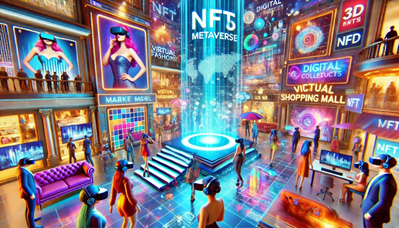The concept of Metaverse, once just a sci-fi idea, is now becoming a real and transformative part of our world. For marketers, it is a new and exciting space full of opportunities to connect with consumers in fresh, engaging ways. This blog explores the potential future of marketing within this virtual universe, examining how brands can leverage the Metaverse to create immersive, interactive experiences that redefine consumer engagement.
What is Metaverse?
The word “Metaverse” was coined by author Neal Stephenson in his 1992 sci-fi novel Snow Crash. The metaverse refers to an immersive and persistent three-dimensional virtual realm, shared with many users, that spans various digital platforms and merges with the physical world, where people can shop, work, play and hang out together in real time.
Meta defines the metaverse as “A set of virtual spaces where you can create and explore with other people who aren’t in the same physical space as you.” An exact definition of the metaverse may be hard to explain because of its depths, but most technology experts agree, that the metaverse is a vast network where individuals via their avatars can interact socially and professionally, invest in currency, take classes, work, and travel in 3-D virtual reality.
In simple words the metaverse is a digital reality that combines aspects of social media, online gaming, augmented reality (AR), virtual reality (VR), and cryptocurrencies to allow users to interact virtually. Though metaverse technology is years away from being fully realized, it is expected to eventually be a place where you can work, play, learn, create, shop, and interact with friends in a virtual, online environment.
Current Scenario Marketing using Metaverse
Metaverse is fast becoming a major player in retail, offering new ways to engage consumers through AR, VR, social media, gaming, cryptocurrencies Brands like Nike, Gucci, Coca-Cola are creating virtual stores already, are hosting events, for digital products and launching, to explore this immersive and immersive space.
- Virtual Storefronts and Showrooms:
Brands like Gucci and Nike are creating virtual spaces where customers can explore and purchase products.
For example, Nike’s “Nikeland” on Roblox allows users to interact with the brand in a virtual environment, playing games and purchasing digital apparel.
- Digital Product Placements:
Advertisers are placing digital products within virtual worlds.
For example, in games like Fortnite, brands like Balenciaga have launched digital clothing lines that players can purchase for their avatars.
- Immersive Experiences:
Brands are leveraging the immersive nature of the Metaverse to create unique experiences.
For example, Coca-Cola launched a virtual concert within the Metaverse, allowing users to enjoy music and interact with the brand in a new way.
- Sponsorships and Collaborations:
Companies are partnering with Metaverse platforms to increase their visibility.
For example, Samsung has created virtual experiences within Decentraland, allowing users to explore a virtual replica of their New York flagship store
Marketing Strategies in the Metaverse
- Virtual Stores and Showrooms:
Brands can set up virtual stores where customers can explore and purchase products.
- Interactive Ads:
Create engaging advertisements that users can interact with in the virtual environment.
- Virtual Events:
Host product launches, concerts, and other events to attract and engage a virtual audience.
- NFTs (Non-Fungible Tokens):
Use NFTs to offer unique digital items, fostering exclusivity and brand value.
Challenges and Considerations
- Technical Barriers:
High costs and technical knowledge are required to develop and maintain virtual environments.
- User Adoption:
Not all customers are familiar with or have access to VR/AR technology.
- Data Privacy:
Protecting user data and ensuring privacy in the metaverse is crucial.
Future Trends
- Immersive Experiences:
The metaverse will provide immersive, interactive experiences that go beyond traditional online interactions. Brands will create virtual spaces where users can interact with products in 3D environments.
- Virtual Commerce:
Shopping in the metaverse will enable consumers to try on clothes, test products, and even attend virtual fashion shows or product launches.
- Social Interaction:
The metaverse will integrate social media aspects, allowing users to share their experiences in real-time, fostering a sense of community and brand loyalty.
- NFTs and Digital Ownership:
NFTs will play a significant role, allowing users to own unique digital assets. Brands can leverage NFTs for exclusive products, collectibles, and loyalty programs.
- Augmented Reality (AR) Integration:
AR will enhance real-world environments with virtual elements, offering interactive advertisements and experiences that blend the physical and digital worlds.
How Businesses Can Prepare
- Invest in Technology:
Businesses should invest in the technology needed to create and manage virtual environments, such as VR headsets, AR applications, and 3D modelling tools.
- Develop Expertise:
Hire or train staff with expertise in virtual reality, augmented reality, and 3D design to create engaging and high-quality virtual experiences.
- Collaborate with Tech Partners:
Partner with technology companies that specialize in metaverse development to stay ahead of the curve and leverage their expertise.
- Experiment and Innovate:
Start experimenting with small-scale virtual experiences and gather feedback to understand what works best for your audience.
Conclusion
The metaverse will change how marketing works, offering new ways for brands to connect with people through immersive and interactive experiences. To get ready for this, businesses should invest in the right technology, develop skills in virtual reality, and build strong online communities. It’s also important to focus on privacy, accessibility, ethics, and user experience to ensure responsible and effective marketing. By following these steps, businesses can lead in the new marketing world, using the metaverse to create memorable and impactful experiences for consumers.
References:
https://influencermarketinghub.com/state-of-the-metaverse/
https://blog.emb.global/navigating-the-metaverse-marketing-trends-of-2024/
https://www.clickinsights.asia/post/5-top-metaverse-marketing-trends-for-2024/
https://www.vice.com/en/article/93bmyv/what-is-the-metaverse-internet-technology-vr/
https://www.forbes.com/sites/deborahlovich/2022/05/11/what-is-the-metaverse-and-why-should-you-care/
https://www.investopedia.com/metaverse-definition-52065



